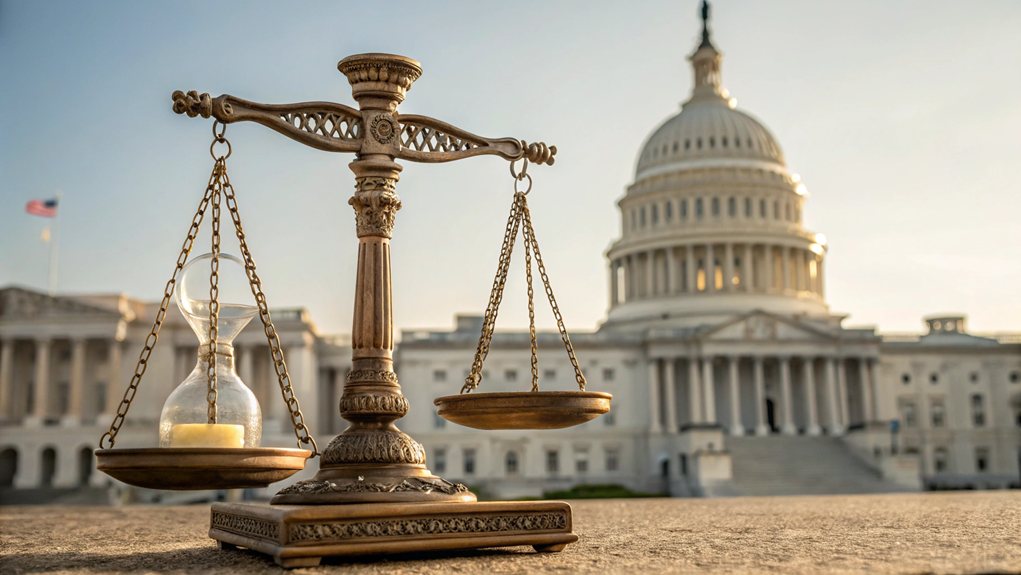Lobbying wields significant influence in American politics, often drowning out regular citizens' voices. Registered lobbyists meet lawmakers face-to-face and throw big bucks around to sway decisions. Politicians love lobbyists—who fund their campaigns—because, let's face it, money talks. This setup favors resource-rich corporations, leaving everyone else in the dust. Sure, it can help some marginalized groups, but mostly, it's a rich man's game. Curious about what this all means for democracy? Stick around for more.

In a world where money talks louder than words, lobbying struts around the American political system like it owns the place. It does, in a way. Lobbying is that curious practice where various groups, often with deep pockets, try to twist the arms of lawmakers to get their way. Thanks to the First Amendment, it's all above board—sort of. The Lobbying Disclosure Act of 1995 guarantees these activities are registered, but let's be real: it's a system that often favors those who can pay for the privilege. Regulatory frameworks are in place to maintain transparency and accountability, but debates continue on how to reform these systems to better serve public interests.
Lobbying: where deep pockets twist lawmakers' arms, and money speaks louder than the average citizen's voice.
Let's plunge into the numbers. A staggering 95% of lobbying efforts are geared toward corporate interests. So, who really benefits from these lobbying shenanigans? Spoiler alert: it's usually not the average Joe. High-stakes decisions, where the stakes are high and the cash flows freely, illustrate just how powerful lobbyists can be. They convince lawmakers to pass or kill bills like it's a game of Monopoly.
Money is king in this arena. Politicians love a good fundraiser, and guess who's footing the bill? You got it—lobbyists. They cozy up to lawmakers, donating to campaigns, and suddenly, those politicians are all ears. The price tag for influencing policy? Oh, just a casual $4.4 billion in 2024 alone. That's right, folks. Campaign spending for the 2022 midterms topped a whopping $9.3 billion.
Lobbying isn't just about the glitzy fundraisers and backdoor deals. It's also about the types of advocacy. Some lobbyists meet lawmakers face-to-face, while others go the "soft" route, rallying the public. And let's not forget the special interest groups that roll in with more resources than your average individual could ever dream of. Corporate lobbying has become a powerful tool for securing rights favoring corporate interests, often sidelining the voices of ordinary citizens. 95% of lobbying in the U.S. represents big business interests, highlighting the imbalance in influence within the political landscape.
Sure, lobbying can be a double-edged sword. It gives voice to the voiceless but often drowns out those without cash. It's a wild ride through the democratic process, and sometimes it feels less like democracy and more like a high-stakes poker game.
Frequently Asked Questions
How Do Lobbyists Build Relationships With Politicians?
Lobbyists? They're like social butterflies, flitting around politicians.
They build relationships through repeated, strategic interactions. They know when to be persistent and when to back off—it's a fine dance.
Formal meetings? Only for serious business, of course. They sprinkle in personal stories and unique insights to charm lawmakers.
And let's not forget: they're often former officials themselves, leveraging their insider access.
It's networking, but with a dash of power and cash.
What Regulations Govern Lobbying Activities in the U.S.?
Lobbying in the U.S. isn't a free-for-all. There are rules—serious ones.
The Lobbying Disclosure Act requires folks to register if they spend more than $13,000 on lobbying. They must report their activities quarterly, too.
And if you think federal funds can be used for lobbying, think again. Misuse? Expect hefty fines.
The First Amendment protects lobbying as a right, but let's be real: it's a game of money and influence, not just ideals.
How Is Lobbying Different From Political Campaigning?
Lobbying and political campaigning? Totally different beasts.
Lobbying is all about cozying up to lawmakers—think meetings and phone calls to push specific agendas.
Campaigning? That's the showtime, folks. It's about rallying support for candidates with ads and fundraising.
One's influencing decisions behind the scenes; the other's front and center, swaying voters.
Both fight for attention in the political arena, but their methods and goals? Worlds apart.
And yeah, it gets messy.
What Role Do Grassroots Movements Play in Lobbying?
Grassroots movements are like the loud, passionate voices in the back of the room. They rally everyday people to push for change—think letter-writing campaigns, petitions, and town halls.
This isn't just noise; it's powerful. When folks unite over an issue, politicians pay attention. Unlike slick lobbyists, these grassroots efforts tap into real emotions.
They bring the public's concerns right to the doorstep of decision-makers. It's democracy in action, raw and unfiltered.
How Can Citizens Influence Lobbying Efforts in Politics?
Citizens can totally shake up lobbying efforts if they want to. They have the right to petition—thanks, First Amendment!
Joining forces with organizations that match their values? Smart move. Voting? Yeah, it's seen as a big deal for influencing politics.
Grassroots movements can rally the masses, making a real impact.
And let's not forget: pushing for transparency in lobbying is like shining a flashlight in a dark room. Time to hold them accountable!








3 comments
Comments are closed.